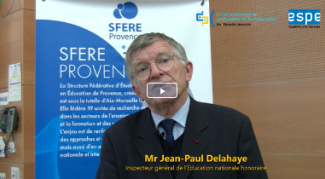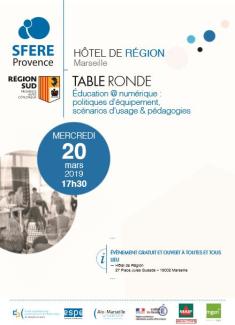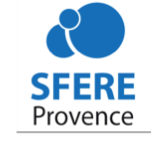AMPIRIC project working day
-
Show description
September 23rd, 2020 -
Campus Saint Jérôme - 52 Av. Escadrille Normandie Niemen - 13013 Marseille
This first day of work will be an opportunity to begin the concrete implementation of each of the project's actions. Each action will give rise to a workshop; when you register, you will be asked to indicate in order of preference the workshops to which you would like to contribute (you will be able to participate in 2 out of 3 workshops in the morning and 2 out of 3 in the afternoon).
The registration form for this day will be online soon.
September 23rd, 2020 -
Campus Saint Jérôme - 52 Av. Escadrille Normandie Niemen - 13013 Marseille
This first day of work will be an opportunity to begin the concrete implementation of each of the project's actions. Each action will give rise to a workshop; when you register, you will be asked to indicate in order of preference the workshops to which you would like to contribute (you will be able to participate in 2 out of 3 workshops in the morning and 2 out of 3 in the afternoon).
The registration form for this day will be online soon.
-
Show description
Colloquium "Create to educate. The place of transdisciplinarity " A democratic education through the arts
15-16 May 2019 13100 Aix-en-Provence
Following the first symposium "Create to educate. The place of transdisciplinarity". which took place on 3 and 4 April 2018 at the ÉSPÉ of Aix Marseille University and the Fernand Léger Arts Centre of Port-de-Bouc, the people in charge of the programme "The creative gesture and the formative activity". (GCAF) of EA 4671 ADEF renew a call for papers for a second session on 15 and 16 May 2019 in Aix-en-Provence.
Considering the collaboration between artists and the school as being inscribed in the spirit of the Projet d'éducation artistique et culturelle (PEAC) and implemented by the National Education since 2015, we wish to bring together artists, trainers, researchers, and representatives of major artistic and cultural institutions who propose efficient collaborations in terms of teaching, learning, training and learner development.
This colloquium will focus on the place of the body (its gestures, its postures, its motricity) in its inscription in space, its solicitations increased, modified, crossed according to transdisciplinary devices conceived, some of which explicitly call upon the body to engage it differently. Others do not integrate the body into their reflections but make it take different positions or play different roles. Whether it be visual arts, music, dance, theatre, design, in relation to other disciplines taught at school, the body as a learner and the body as a teacher are called upon to play/perform. What happens in the development of learning when these disciplines are connected to each other?
This session will analyse the results obtained in the framework of these collaborations in all artistic and non-artistic disciplines, taught in schools, colleges and high schools and in specialized education (art and design schools, conservatories, cultural associations).

Games & Stakes Symposium
13 - 14 May 2019 ESPE, La Canebière, Marseille, France
Games and simulations for individual, group and organizational learning
Meetings of practitioners of participatory simulation and serious gamesFollowing on from the Jeux et Enjeux 2017 meetings in La Rochelle, the Jeux et Enjeux 2019 conference in Marseille aims to bring together practitioners of serious games and participatory simulation. This year, in addition to the enhancement of the 'individual' dimension-collective' of simulation games, we will pay attention to the educational power of games, in schools, universities or other places of learning, such as vocational training.
This conference is intended to be a space for sharing between different audiences, teachers, practitioners of serious games and participatory simulations (J&S) and researchers, and where construction, animation, and debriefing will be discussed, as well as analysis of the effects of the game on knowledge and skills (cognitive, social, professional, etc.). It will take place at the ESPE (Ecole Supérieure du Professorat et de l'Education), which will allow the participation of future and experienced teachers interested in the theme.

SFERE-Provence Conference - Jean-Paul Delahaye
April 24, 2019 - ESPE 13100 Aix-en-Provence - Amphitheatre D from 1.30pm to 4.30pm
"What Poverty Does to School- What School Does to Poverty"
Jean-Paul Delahaye - Honorary Inspector General of National Education - Former Director General of School EducationThe conference is an opportunity to enter into the daily life of a youth about whom very little is said, of an invisible yet numerous youth: the children of the poor. A sort of blind spot of the Republic because, as the philosopher Simone Weill used to say, "To make himself invisible, what man has no surer way than to become poor..."». On the basis of his report Extreme poverty and academic achievementthe choice of solidarity for the success of all, handed over in 2015, Jean-Paul Delahaye gives the floor to those who can testify to what poverty does at school. How can one enter learning serenely when one is badly housed, badly cared for, badly fed, badly dressed...? If all the children of the poor do not fail at school, if school is not responsible for everything (without school, inequalities would be much worse), what the school does with poverty can be measured on the basis of this now well-known observation: France is one of the OECD countries in which the weight of social origin weighs the most heavily on educational destinies. Let's face reality: our elitism is more social than republican.
But there's no fatality to that. Jean-Paul Delahaye focuses his remarks on two complementary actions that are necessary if we really want to make our school fairer: social and health actions to help all pupils enter the learning process and a rethought pedagogical organisation of the school for an educational system that is not essentially focused on the function of sorting and selecting the best.

First restitution seminar for DAFIP "Research-Training-Training-Terrain" projects Wave 1
21 March 2019 - 9:00 am - 5:00 pm
Lycée Général et technologique St Exupéry - 529 Chemin de la Madrague-Ville, 13326 MarseilleThe seminar took place on Thursday 21 March 2019, in the framework of the development of cooperation between the Priority Education networks and research, strongly encouraged by the Rector, the Academic Delegate for Training and Pedagogical Innovation, the Director of the Research Federation SFERE-AMU and the Director of ESPE .
In the form of a round table with two main ideas in mind: on the one hand, to bring together pedagogical teams from the REP and REP+ networks with research teams from laboratories of the SFERE-Provence research federation and, on the other hand, to strengthen and develop the role of the institution in initial and continuing training.Round Table 1 what the projects conducted tell us about the developments for the students.
Round Table 2 What the projects carried out tell us about the evolution of the teaching teams.
Round Table 3 The research projects tell us about the evolution of the research teams.
Round Table 4 What the projects carried out tell us about the evolution of educational communities and the students' environment.

SFERE-Provence Round Table: Education@numeric
March 20, 2019
Education @ digital: equipment policies, usage scenarios & pedagogies
The federative research structure SFERE-Provence and the Southern Region, organized a round table on March 20, 2019 to question the consequences of the introduction of digital technology in schools in terms of student learning, changes in teacher practices, profound changes in school organizations, and the involvement of businesses.
In her introductory speech, Marie-Florence Bulteau-Rambaud, President of the Lycées, apprentissage, formation, professionnelle et jeunesse commission of the South Region, defended the choice of experimenting with digital textbooks as part of the reform of the lycée for the start of the 2019 school year. For his part, Pascal Terrien, Deputy Director of SFERE-Provence (Aix-Marseille University), recalled how the subject of digital learning remains a lively and, in essence, transdisciplinary issue for researchers interested in the conditions of transmission of knowledge in training.
Fourteen personalities from the world of research, business (Mapplesoft, Qwant, Texas Instrument), the Regional Council, and the Aix-Marseille Academy, exchanged their views on the impact of digital technology in schools.
The debates made it possible to distinguish several logics that work together, those of entrepreneurs, designers, prescribers, users, researchers of and on the digital. Perspectives were drawn on the enlightened uses of digital technology in student learning and educational organizations. Among them is the need, imposed on all these actors, to work in a network, from the design of tools by identifying needs, to their dissemination and, beyond that, support for uses, whether individual or collective. Such an approach presupposes thinking, for example, about the specific learning involved, data security, initial and in-service teacher training, the support provided by the companies involved and the obligation to diagnose the effectiveness of the tools.All the speakers agreed to continue the reflection on "educational digital", with at least three major objectives: to encourage creativity and innovation on the part of users; to guarantee the transferability of knowledge and devices; and to ensure the development of teachers' skills and, consequently, those of pupils.

Science Day - Addiction Prevention Research Questions Should we be afraid of what children and youth have to say about health?
Tuesday 11 December 2018 - 08h30-17h00 - Amphithéâtre Noailles - 63 La Canebière, 13001 Marseille
National Science Day on the Prevention of Addictive Behaviours. This day is co-organized by the UNIT (Network of Universities for Health Education), ESPE Aix-Marseille University, SFERE-Provence FED4238, the ADEF laboratory), the University of Clermont-Auvergne (Institut Pascal / UMR 6602) with the support of the MILDECA (Interministerial Mission for the Fight against Drugs and Addictive Behaviour).
This scientific day will focus on the methodological approaches used in the fields of research and intervention, in order to better understand and question the impact of actions carried out in the field of addiction prevention.

1st SFERE-Provence conference "Learning and Education" Conditions, contexts and innovations for school, university and professional success
11-13 April 2018 Marseille
Colloquium organized by the Structure Fédérative d'Études et de Recherches en Éducation de Provence (SFERE-Provence FED 4238) of Aix-Marseille University, under the patronage of the Minister of Higher Education, Research and Innovation, Frédérique Vidal, and the patronage of the Minister of Education, Jean-Michel Blanquer..
Its objective is the decompartmentalization of disciplines in order to develop knowledge in the teaching, education and training sectors, whether on school organizations or institutionalized training systems. By bringing together several university laboratories, the federation gives greater visibility to the research policies conducted and, as a result, improves the coordination and the social and scientific scope of educational research.
Axis 1 "Language skills and communication". aims to highlight the importance of language and communication skills for the development of core competencies.
Axis 2 "Use of the body and education" . is interested in interdisciplinary approaches to the use of the body in student/learner/teacher/trainer activity, in teaching, education and training contexts.
Area 3 "Territories, trajectories and mobility". raises the question of inequalities in educational trajectories, social origin and migration.
Axis 4 "Creativity and innovation". allows to focus on pedagogical innovation in different teaching/learning systems.
